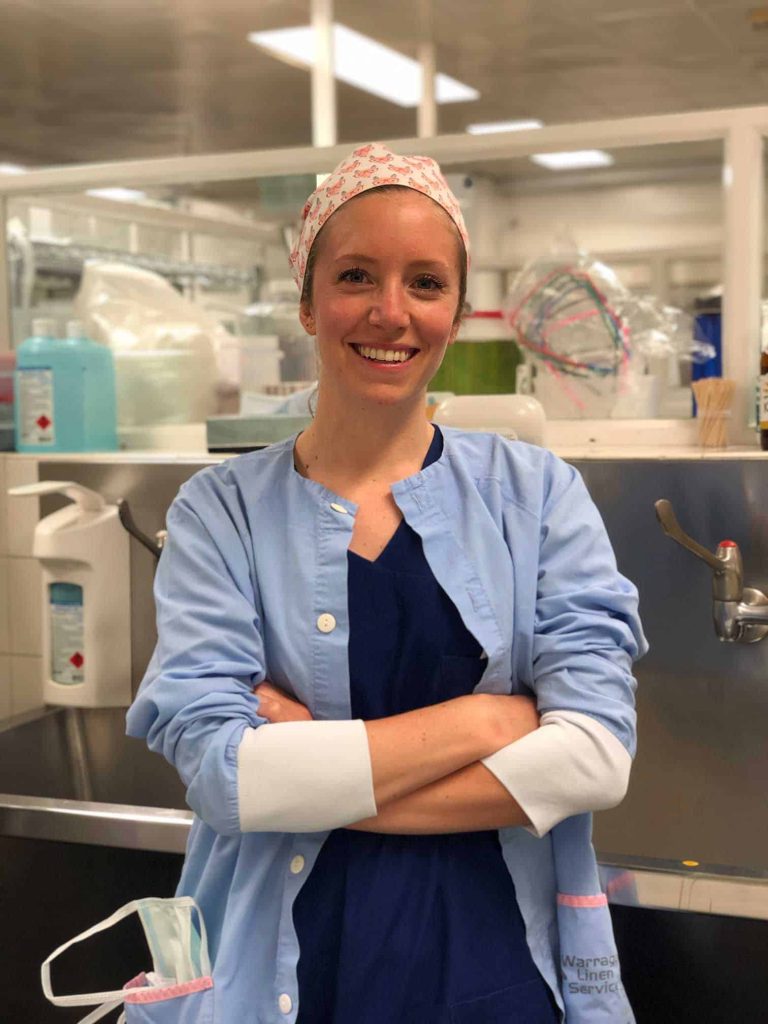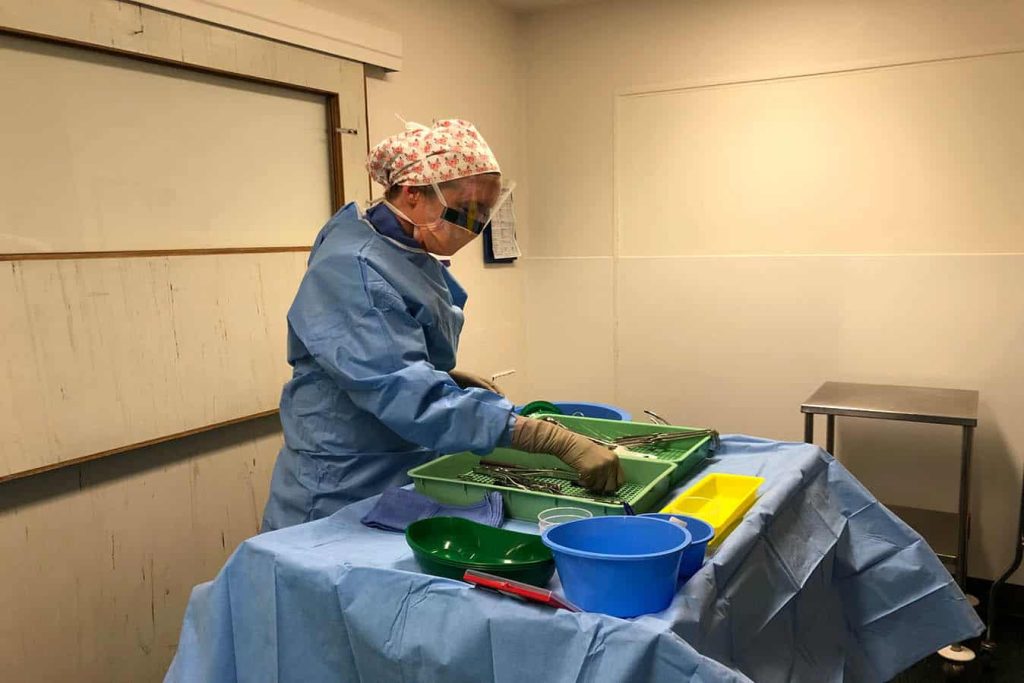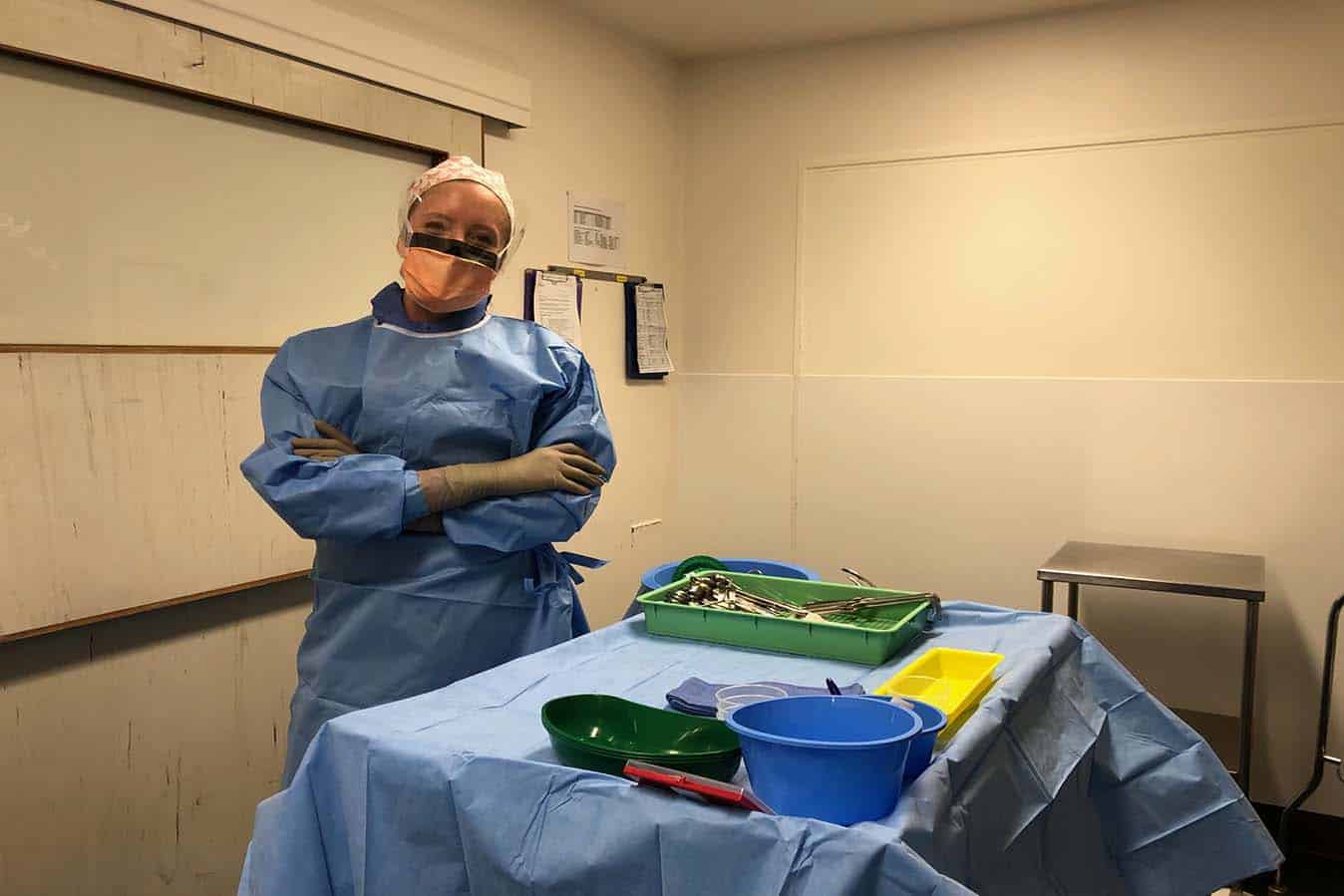You’ve ‘got to be on’ the whole time. If you lose concentration you can have a sharps injury or drop a piece of equipment you only have one of – you can’t daydream in theatre,” says Victorian perioperative nurse Ashleigh McCoy.
Today, 14 November is international operating room nurse day celebrating the work of theatre nurses around the world.
Ash, a clinical nurse specialist in theatres specialising in burns, plastic and facio-maxillary at The Alfred hospital, Melbourne says there’s a lot of job satisfaction in working in theatres.
“I guess I have those skills that are required to work in theatre – you need to be organised, tidy, have attention to detail, and show initiative. And you need to be able to anticipate surgeons’ needs and think of what they need before they do; you are ‘operating with them at the same time’.”
Ash completed a graduate program at The Alfred, and then worked on the burns and plastics ward ‘6 west’ where she “discovered my passion for burns and the OT. I love wounds.”

After three years, Ash applied for The Alfred’s highly-sought after Theatre Transition Program which was internally advertised. In the most recent intake there were 30 applicants vying for just four positions.
“I was lucky enough to get a position – it’s a coveted position. People want to transition to theatre.”
The Alfred, which is a major trauma centre has 10 operating theatres. In a usual operation, theatre consists of an anaesthetic nurse, technician, a scrub or instrument nurse, one to two circulating or scout nurses, a consultant and one or two registrars and possibly a resident doctor.
The Alfred’s specialty theatre areas include: burns, plastics and facio-maxillary; vascular; ENT/neuro; cardiothoracic; and transplant.
The burns, plastics and facio-maxillary nursing team consists of an ANUM, two CNS’, including Ash, and about 4-5 fulltime theatre nurses.
“You have to be willing to adapt to shift work. It’s not Monday to Friday. Amputated limbs don’t wait.
“It takes teamwork. As a perioperative nurse you really need good interpersonal skills to work in theatre and the ability to work with a variety of personalities – and in stressful situations.
“When re-attaching someone’s arm that has been amputated by machinery, the adrenaline is pumping, it’s so time sensitive – we have to re-attach this arm or it will die. This person’s life will completely change if we don’t do this.”
As a perioperative nurse you have little contact with patients and the work is physically demanding, says Ash.
While a large proportion of the work involves repair of lacerated limbs, washouts and split skin grafts, The Alfred is renowned for its pioneering revolutionary procedures, including osseo-integration and targeted muscle re-innervation (TMR).
TMR allows the patient’s brain to directly control a specially engineered prosthetic limb through a process of surgery, rehabilitation and brain training.
“It allows the patient’s brain to communicate with the amputated limb. It’s incredible,” says Ash.
The Alfred is Victoria’s Adult Burns Centre, treating all of Victoria’s major burns, including bushfires. The Black Saturday bushfires resulted in a review of policies and procedures and how burns are treated at The Alfred, says Ash.
“It’s very specialised, it’s very confronting. Its physical work, the OT temperature is at 28-32 degrees and you can be scrubbed for five hours straight.
“You need to be physically fit, have stamina and endurance and be able to concentrate for long periods of time.”

Downtime is important away from the job; Ash has been practicing yoga for 10 years.
“I believe this is really important for not only my physical health to stretch out after standing all day but also my mental health to ‘switch off’.”
She is a “mad Richmond supporter” whose work and indeed – life – roster is scheduled around the footy fixture. Ash loves to hang out with fiancé Dave with the pair to be married in March. She enjoys camping, weekends off (what nurse doesn’t) and good food.
“I would say if you fit the criteria – you are organised, tidy, have attention to detail and great interpersonal skills – then you will make an exceptional theatre nurse. Inquire about theatre opportunities in the hospital where you work.
“It’s not easy because it’s so specialised. Gain experience in surgical wards, you learn a lot and it’s where I discovered my passion for burns and plastics.”









6 Responses
Just add an ability to go without fluids and food, have a cast iron bladder and a very strong pelivc floor. Sense of humour essential! (40 years in theatre and still practicing).
Theatre nurses rock
Not enough appreciation is given to theater nurses they do such a wonderfuljob of a demanding task.
You guys do a great job looking after all patients
Thank you ????
The treatment I recently received in theatre was fantastic. So caring and kind. What a fantastic job everyone does. Thank you our wonderful NHS!???
Dear Nurses – I have absolute admiration for you all. You carry a workload that is beyond many peoples’ comprehension. It is hard, stressful and debilitating work and your pay is low and not commensurate with your responsibilities. Thank you for all you do for us when we are unwell and for your smiles and dedication to the tasks at hand. Without you many of us would not be here. Thank you all and God bless. John Casburn